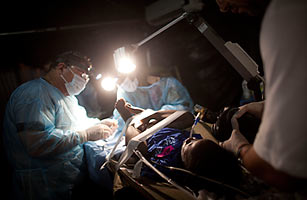
A Haitian is operated on at the Israeli army hospital in Port-au-Prince
(2 of 2)
"We scrounged for some equipment from the destroyed hospitals, and we have two patients on ad hoc dialysis, but they won't last long like this," says François Domet, a spokesman for Doctors Without Borders. The group reopened its facility at St. Catherine's Hospital in Cité Soleil, one of Haiti's most dangerous neighborhoods, after three of its offices around Port-au-Prince were destroyed. It has since opened seven more sites and has treated more than 3,500 patients in Cité Soleil alone. "Five patients died of kidney complications yesterday while several of our planes bearing dialysis equipment were told they could not land in Port-au-Prince," Domet says. The U.S. military, which controls the airport, says there is a big backlog of flights coming in, and it is doing its best to accommodate everyone.
Aside from crush syndrome and gangrene, patients with chronic health problems are particularly vulnerable. More than 200,000 Haitians have HIV/AIDS, and without medications they could fall seriously ill. Yvens St. Ylaire, who will turn 1 on Jan. 24, was born with a sealed anus. His parents have been saving up for an operation to fix the problem, and while they were waiting for the procedure, a shunt was inserted. He, his parents and twin sister survived the earthquake, but his shunt has not been changed since. His parents waited anxiously on Jan. 19 at the Adventist University Hospital for a doctor to help Yvens. "Our house was destroyed, and we lost three family members," says Erick St. Ylaire, Yven's dad. "But right now he is our first priority," he says, soothing his son's bloated stomach.
Every facility is overwhelmed, though the arrival of the Comfort and an additional 11 medical units should help. The Comfort, with its 550 medical staff members, can treat 1,000 people at a time, but getting to the ship has been complicated by the lack of piers. On Jan. 20, patients were either choppered in or taken aboard via amphibious boats. Medical teams are only now starting to move into neighborhoods to look for the ill who cannot travel — a process that will take weeks, if not months. "Getting a doctor is very, very difficult," says Loremas, hovering over his niece outside the Israeli hospital. "I pray to God every day to let me and mine live." There are few in Haiti who aren't saying similarly desperate prayers as doctors race against time to save as many as they can.
Read more in the new book TIME Earthquake Haiti: Tragedy and Hope and support TIME Haitian relief efforts